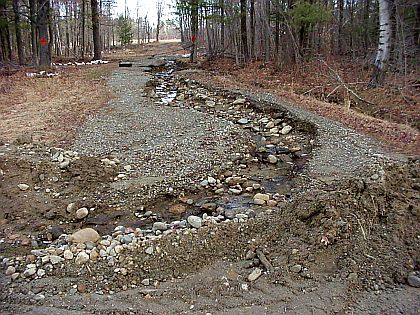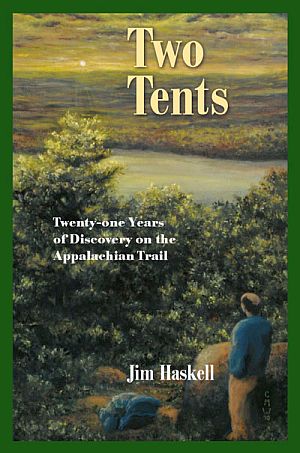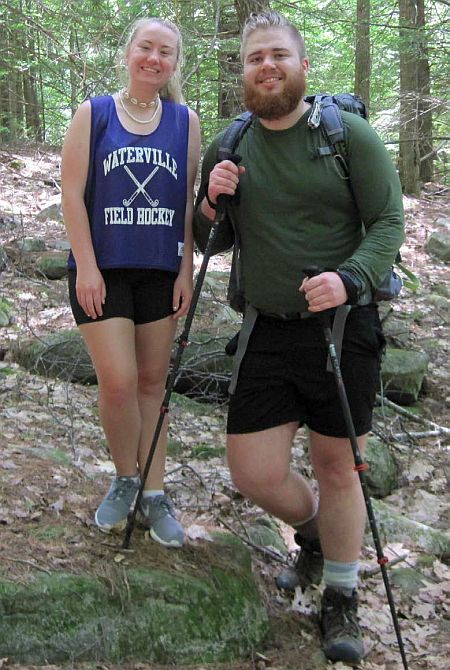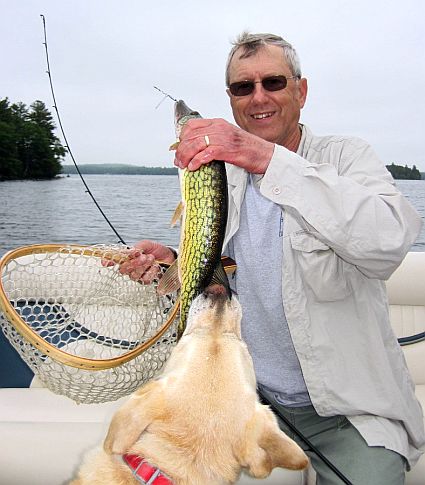
Now in its eleventh summer, the Atlantic Music Festival brings rising young musicians, many in their twenties, to Colby College for four weeks of private lessons, master classes, rehearsals, and performances. From July 15 to 27, the festival's roughly 140 students, 40 fellows, and 50 faculty will give free performances nearly every evening and some afternoons as well. For a complete schedule, visit www.atlanticmusicfestival.org.
Highlights from this issue…
- The Local Side of Worldwide: About John
- Gone Fishin', Part I
- Are You Thinking About Working on Your Camp Road?
- Nicely Above Full Pond
- Two Tents
- Fishing and Hiking
Download Full Print Edition [PDF] • Links to Other Pages on This Site
These archival articles are presented “as is.” Except for minor corrections or clarifications, most have not been updated since they appeared in print. Thus, some details may be out of date, and some hyperlinks may no longer work.
The Local Side of Worldwide: About John

John Willey
When the famed and acclaimed of international films are celebrated in Waterville during the Maine International Film Festival, MIFF, each summer, a few gems of state and local subjects, significance and filmmaking are among them, accenting rich state lore such as coastal island life, a mountain town, lobstermen or the state's French heritage.
This year, one of those unique films is a tribute to exceptional native Mainer John Willey, poet, woodworker and boatbuilder documented by longtime summer resident, filmmaker Lauren Shaw.
Shaw has extensive credits and awards nationally and internationally for her filmmaking, but her connection to Maine and to the Maine International Film Festival centers on the documentary films Maine Women: Living on the Land, which premièred at MIFF in 2005, and A Drop in the Bucket, which premièred at MIFF in 2009. Her latest feature documentary, Angkor's Children, has screened in 16 festivals around the world and at many prestigious venues.
A longtime neighbor of John, who has rowed around every cove and peninsula of Great Pond with him, Lauren states, "I have known John Willey for the last twenty years or so. When my son was thirteen they built a wooden kayak together up the road at Eli's Hill, where John used to live. Since that time, John has become part of our family life in Belgrade Lakes. We have spent many summers paddling together in silence across our beloved Great Pond until after a while, John would sing in his baritone voice "Amazing Grace." We have explored ancient rocks, petrified wood, and loon harmonies. We have sat on our dock at sunset toasting the summer, friendships and life, always marveling at the sky."
Lauren describes, "John is an example of 'amazing grace.' He was born in Clinton, Maine, and schooled at Goodwill Hinckley where he has become the most devoted alumnus ever to graduate. His heart is filled with generosity, joy and love. He is one of the most wellread people I know and his curiosity continues to inspire me. His kindness is gentle and his laugh is unforgettable."
"How do you make a film about a man who does not think or speak in straight lines?" Lauren asks. "His storytelling is poetic, wandering and long. So when I set out to make a film about his life, his beloved wife Barbara warned me it would not go well."
Although Lauren has years of footage, which include interviews and sequences, she ultimately knew the only way to share John with an audience was through his poetry. "About John" is "a visual contemplation driven by the poetry of John Willey and the richness of his surrounding natural world."
In summary, Lauren states, "I am honored to pay tribute to this remarkable man and thrilled to share this film at the Maine International Film Festival, which has been part of our lives for the last twenty-two years."
▲ To Table of Contents • Print Article • To Other Links ▼
Gone Fishin', Part I
It was four months after my eighth birthday in July of 1955. Lee asked me if I'd like to go out fishing the next day with Elmer and him. He said he'd been watching me catch perch in the stream as well as off the bridge and figured it was about time I moved up and learned how to troll out in the lake. In those days the lake was stocked yearly with trout and salmon and a good number of them had grown to several pounds.
To this I replied, "Yes, sir," and worked hard at not jumping up and down with joy and showing him how elated I really was. The idea of catching a big fish instead of my usual perch and sun fish sounded like the chance of a lifetime. However, even more exciting than that was the hope that the two old men would let me drive the outboard — but I didn't dare to ask him if that would happen.
Before we go any further, let me introduce you to Lee and Elmer, whom I describe as old men. I now realize that neither of them had reached much more than 60 years, give or take a few.
Lee was a soft spoken man of slight stature, perhaps five foot four inches with no extra fat on him and bright white hair. He lived alone on Main Street in Belgrade Lakes in a rented apartment attached to the rear of the house now owned by Carl Cook. The so-called apartment was actually a rustically remodeled barn/shed and was torn down about 25 years ago.
Lee worked for my father Clifford during the summers tending our boat rental business down by the dam. He was also a neighbor and friend of my folks as we lived in the house next door. Lee would, on occasion, come over for a supper, if my mother walked over a little ahead of time and invited him.
He was always good natured, had a sense of humor and was apt to spew out a joke now and then that bordered on raunchy. He was careful to only tell the socially acceptable ones while at dinner at our house, knowing that mother might not ask him over again if he wasn't careful. I knew from hearing occasional swear words down at the boat shop, when the men would all roar with laughter, that he was more than capable of saying words that mother wouldn't like.
The boat rental shop was equipped with everything necessary to do carpentry and light mechanical work, and it also always had a bottle of whiskey under the bench. Lee was not above partaking in a "small snifter" upon occasion as the day wore on, claiming that his arthritis was acting up. Often others would stop by and join him, one being my second elder fishing partner Elmer Green. Many of the old men in town stopped by just to pass time and shoot the bull.
Elmer and his wife Elsie had a home on Skunk Alley (Hulin Road), and their property somehow bordered our house on Main street. Once again, it was a little village so we were all quite close neighbors. Elmer and Elsie lived in their house during the spring, fall, and winter. During the summer they operated and lived at what is now known as Village Camps, just north of the dam on Long Pond. It was then known as Gillman Camps.
Elmer gave me my first paying job at the age of 8 years. He had a great amount of grass to mow each week, both at the camps and at his home. One day, out of the clear blue sky, he appeared in our back yard when I was out in my tree cabin and wanted to know if I'd like to mow grass. I said, "Sure, I'll do it," and never discussed pay.
He then knocked on our back porch screen door, and mother appeared. He cleared it with her, and I followed him down across the lawn and was introduced to a wobbly wheeled old mower with a Briggs and Stratton motor on it. He showed me how to start it and told me to make a few passes and not to miss any spots, as Elsie liked it to look really good. Elmer wore the old man T-shirts with shoulder straps and as I went on my very first pass he sat down in the lawn chair, got out a can of Prince Albert pipe tobacco and rolled a cigarette.
After that we were weekly mowing buddies and it took us both most of one day (with rest stops) to mow both areas. During the stops, Elmer would smoke and perhaps drink a Narragansett, Elsie would bring me lemonade. At the end of the day, Elmer sat down again and handed me six dollars. I was sure that I was rich.
This completes Part I. We hope that you will come back next week and join us as we get out on the water.
▲ To Table of Contents • Print Article • To Other Links ▼
Are You Thinking About Working on Your Camp Road?

Don't return to this next spring when you come back to camp.
It isn't too late for you to plan work on your gravel road. As part of our focus on Non-point Source Pollution, gravel roads are this week's topic.
In rural Maine we often need to travel on a gravel road. Around our camp we, or our road association, may be responsible for the gravel access road. Those road surfaces frequently collect and direct runoff into our lakes, ponds, streams and wetlands. Unlike public roadways, you or your road association are responsible for their impact on water quality.
Much of our conservation work and the work of various road associations and watershed groups focuses on gravel road work. Gravel road erosion is a major source of sediment into our lakes and that sediment carries phosphorus in addition to other toxins like road salt, oil and the like. Gravel roads and their associated ditches can also serve to concentrate the stormwater runoff from adjacent properties.
Improving the way those gravel roads function is an excellent way to help protect water quality. Given all the use those roads get during the summer, an improved road both costs less money over time and makes for a less destructive "mud season." Given the long and relatively wet spring, those problems may seem more severe. Potholes have appeared, ruts have developed in the tire lanes, ditches may NOT be directing runoff into vegetated areas or sediment pools. Instead, the roadway, culverts, and ditches can act like a funnel to concentrate the road runoff.
The Kennebec SWCD focuses on Gravel Road Management Plans to provide landowners a better understanding of how their road impacts water quality and how to manage its maintenance and improvements to minimize that impact. A good road management plan provides the landowners with information to better budget their resources devoted to their roadway. Those resources include the dues paid by landowners and the volunteer or contractor work to maintain it. A better maintained road can save a property from damage caused by stormwater leaving the roadway and damaging adjacent property. It is important for people to better understand how the road "works."
The feedback is good from people about road plans. People prefer having a long-range plan to protect the investment already made in their roadway. It allows them to make plans for the future. The road management plan is usually for the "shared" road, i.e. the responsibility of all the property owners. But, many of the recommendations and Best Management Practices can be modified to help the individual camp owners better manage their own driveway. We do NOT want to see these gravel roads simply become a means to transfer silt and phosphorus to our waterways. Intercepting that stormwater is an excellent way to help protect water quality.
We are beginning to recommend a late fall road maintenance plan to help protect water quality over the winter. The stormwater runoff happens even if you are not at camp! So late season road maintenance can pay dividends by helping to avoid some of the spring damage. …And with the improved attention to long-term maintenance people can expect better long-term water quality. Definitely a win-win situation.
Remember, there is a lot to do in order to protect water quality.
Now retired, Dale Finseth was executive director of the Kennebec County Soil & Water Conservation District from 2001 to 2024.
▲ To Table of Contents • Print Article • To Other Links ▼
Nicely Above Full Pond

As I am writing this week's report we just received another 0.86″ of rain here in the Belgrades. June was forecasted to be 23% less precipitation than normal, not more. July's forecast is now down from 26% to 16% less precipitation. August is still forecasted at 26% less precip than normal so we'll see!
All of our ponds are still nicely above full pond. Great Pond is 4.2″ above full, Long Pond is 1.92″ above and Salmon is about ½″ above full pond. For a trip down memory lane, last year at this time Great Pond was 5.76″ BELOW full with both gates completely closed. Long Pond was 3.36″ BELOW full as well with both gates also completely closed so you can easily see the difference a little rain can make. You will see that all of our gates are still somewhat open to augment the existing flow over the spillways. If not, we would be flooding out our feathered friends as well as most folk's docks. It's always a delicate balance but your volunteer Dams Committee has proven up to the task.
This is the week that you will want to keep an eye out for baby loons as it is this time of year — again! We have lost a couple of loon nests already this season due to predation but we are hopeful that our loon population will continue their resiliency but we are no longer taking anything for granted.
The forecast for the next 10 days is just 0.86″ of precip so we are starting to normalize a bit which is great for our visitors, residents, gardens, farms and our ponds.
You can also see in the photo above the potential effect of uncontrolled high water as well as the reason for a 200″ State No-Wake Zone! There are numerous reasons for having this 200″ zone.
Enjoy your summertime in the Belgrades!
Dick Greenan is secretary to the Belgrade Lakes Watershed Dams Committee. He wrote and submitted this report on 6/27.
▲ To Table of Contents • Print Article • To Other Links ▼
Two Tents

Jim Haskell is another Maine author who kept me turning the pages! Yes, in only two days I read Two Tents: Twenty-one Years of Discovery on the Appalachian Trail. Read to find out how he earned his trail nickname "Two Tents" as a section-hiker and not a through hiker on the great Appalachian Trail from Maine to Georgia. As a slow reader, I feel very accomplished in completing this Belgrade library book so quickly. Jim's completion of the trail was on 10-10-10, almost sounds like Two Tents — remove a "10."
As a boy, Jim had climbed Mt. Katahdin twice with his dad. This started his hiking juices flowing. The Appalachian Trail northern end point made him curious about the entire trail south to a Georgia mountain as developed by two Mainers, of course. Mt. Washington was the original plan, but Katahdin won out in the final plan for up here.
To read Haskell's descriptions of different sections of the trail reminded me of Bill Bryson's ever popular A Walk in the Woods, made into a decent movie with a funny sidekick not too many years ago. I was gratified to read later that Bryson's sidekick lived a long life without alcohol. As we journey through some of the author's short term hikes on the trail, we learn about the variety of through hikers vs. weekend types who perhaps do not realize the hazards of the trail.
Jim turns out to have lived through some very life-threatening days: one while hiking in Maine in May with snow up to their chins…his first wife hiked this one. He thanked her at the end of his book for planting the seed of completing the entire Appalachian Trail. Both are happily remarried and with children.
Another life-threatening day was when he was alone. Most of his hiking days were alone and he explains this need beautifully. Time for reflection and observing nature. His second wife and their adopted son Jason spent many days on the trail with him as did some nieces and nephews. So he wasn't all alone all the time.
The AT turns out to be quite the place at each rest stop for making friends and sharing cooking, snacks, and warnings ahead on the trail. Sleeping was sound due to all the outdoor exercise and mountain air.
Since I love history, I found several chapters enlightening. "Feuding Founders" explains the differences between the two men from Maine who developed the trail over the years: MacKaye's original ideas vs. Myron Avery's, who connected many of the already existing trails. It stunned me that Avery died so very young, being an outdoorsman and all.
Also, both Bryson and Haskell indicate that Maine is the most difficult part of the entire trail. The canoe passage required in Maine at the rushing Kennebec River made possible by Steve Longley's skill. He, like Avery, died much too young of heart failure, as well.
Saltville, VA has a great museum where Haskell discovers the Confederate history of that part of the trail and the Battle of Saltville. Whoever heard of that battle and massacre, even you Civil War buffs? The AT goes through so much history of our country: from Benedict Arnold's trek to Quebec to Antietam in Maryland to Gettysburg. We are proud Mainers when it comes to Chamberlain of Brunswick and his Maine troops at that Pennsylvania turning point of the Civil War. Both the Skyline Drive and the Blueridge Parkway were the original AT walking paths.
Jim's brother Bob provides a familiar family foreword to this 21 years of completing the 2,179-mile AT. The fiftieth birthday for Jim was at Harpers Ferry, West Virginia where family gathered to celebrate his final steps on the completion of the entire trail. Photos show his triumphant accomplishment day and other scenes along this long journey.
From bears and lightening to hailstones in Virginia, Jim makes his short term hikes on the trail interesting to outdoor people and those who prefer indoors alike. The seven pages of charts at the end clearly show every step of the way from 1990-2010. Congratulations Jim on a great story about a wonderful accomplishment. Now, let's go take a hike!
Chelsea White, a Carmel, Maine artist, painted the very beautiful scene on the cover, which was a gift at the Harpers Ferry fiftieth birthday bash for her Uncle Jim when he finally completed his Appalachian Trail short-term hikes.
By his late twenties, Jim had nearly convinced himself that taking a year off to hike the AT just wouldn't work. The dream was dying — until an encounter with a disenchanted thru-hiker inspired Jim to revise his dream. Don't thru-hike the AT in one year. Take your time. Section-hike it instead.
That is what the author did! Amazing to find out about all the volunteers who clear the path yearly with chain saws and correct washouts, etc. Sounds like our summer camp roads here in Maine.
▲ To Table of Contents • Print Article • To Other Links ▼
Fishing and Hiking

Emily Caron and Ben Collins on Mount Phillip.
Last week included the 49th annual meeting of the Maine Lakes Society, on whose board I served from 2008-2019. We held our meeting at University of Maine at Farmington and had some excellent presentations focused on new technologies for monitoring Maine's lakes and ways lake associations can better motivate their members, legislators, and local communities to protect these valuable public resources.
The Maine Lakes Society is a great organization that works tirelessly to protect and preserve the values and benefits of Maine's lakes, ponds, and watersheds for future generations — through science-based action, education and advocacy. We are always looking for new members and volunteers. Check out our website or call executive director Susan Gallo at 495-2301 to become involved.
As the schools have finished up, more young people are turning up on the lakes and trails. I recently hiked Mount Phillip and met Ben Collins and his half-sister, Emily Caron, beginning their hike. Ben and his brother, Matt, both worked for the Belgrade Regional Conservation Alliance (now 7-Lakes Alliance) while I was the executive director a few years ago. They were both Courtesy Boat Inspectors (CBIs) and Matt also worked with the Conservation Corps for a while. Their sister, Emily, is a current CBI with 7-Lakes Alliance. Ben is getting ready to begin hiking the Appalachian Trail and was doing a training hike. I hiked with them to the top, where Emily sat on Jack's Rock to "Chill for a while," while Ben completed three loops of the trail, planning to rejoin him on the way down on the final leg. It is always good to see local youth out on the trails and helping to protect the lakes.

Mel Croft and Jasper with nice chain pickerel.
For over ten years, the East Pond Association and 7-Lakes Alliance have been implementing a Watershed Management Plan for East Pond that culminated in a major in-lake remediation project last fall. Since the alum treatment, the lake has been clearer than it has been for many years. I hadn't been on the lake since the treatment so my fellow 7-LA board member, Mel Croft, invited me over to do a little fishing with him and Jasper, his fish-hunting dog. We fished for about three hours and caught more fish than we could count, including eight different species: brown trout, chain pickerel, large- and smallmouth bass, white and yellow perch, black crappie, and red-breasted sunfish. Most people don't realize that Labrador retrievers were actually bred to help Labrador fishermen pull in their nets and retrieve any fish that escaped. It's why a lab's favorite game is usually "tug-of-war," and they usually love to fish. Jasper epitomizes the breed.

The author with an East Pond brown trout.
This area offers some great outdoor recreation, whether you like to hike, bike, birdwatch, fish, sail, or paddle a canoe or kayak. Pick up a map of the local trails at Day's Store or from the 7 Lakes Alliance at the Maine Lakes Resource Center (MLRC). Also, please check the 7-LA Facebook page for details on some interesting events scheduled this summer. And make sure you take a kid along on your next outdoor adventure!
Print This Article • Print All Articles • Go Back to Top

Download the Print Edition
The print edition includes all the above articles and much more. You can find a complete table of contents on p. 3. Adobe Reader is required.
◀— Previous • All 2019 Issues • Archives • Business Directory • About Us • Home • Next —▶
©2019 by Summertime in the Belgrades. All rights reserved.
